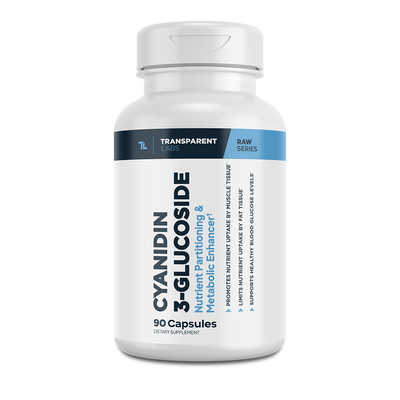Get More Deep Sleep Naturally with These 5 Science-Backed Tips

Are You Getting Enough Deep Sleep?
Deep sleep, or slow-wave sleep, is arguably the most crucial type of sleep for muscle building and tissue repair. During deep sleep, the body secretes growth factors and hormones that facilitate anabolic processes like muscle protein synthesis [1]. Naturally, not getting enough deep sleep can lead to feelings of fatigue, lethargy, excess muscle soreness, and brain fog.
So, how much deep sleep do you need per night? What can you do to get more deep sleep?
This article will discuss common causes of sleep disturbance that might be preventing you from a good night's rest and practical tips for getting more deep sleep.
What is Deep Sleep?
The brain progresses through several sleep cycles — usually 3 to 4— assuming you sleep 7 to 8 hours per night [2]. As you snooze the night away, every sleep cycle has distinct sleep stages with associated brain wave (electrical) activity between neurons. This electrical activity is what determines brain wave frequencies during sleep (and when we're awake).

The two most relevant frequencies throughout sleep cycles are theta and delta brain waves. The frequency and amplitude of these waves correlate to their cognitive effects.
For example, alpha brain waves occur in the 8 to 12 Hz range and indicate a state of calmness and tranquility (such as when meditating or drifting off to sleep). Stage 1 non-rapid-eye movement (non-REM) sleep entails the transition from alpha to theta brain waves that have a frequency range of 4 to 8 Hz. This stage lasts about 20 minutes, then the brain progresses to stage 2 non-REM sleep — a deeper sleep stage, but still mainly in the theta brain wave range.
After stage 2 non-REM sleep, the brain enters slow-wave sleep stages (stage 3 and stage 4), aka deep sleep, where delta brain waves predominate. These low-frequency, high-amplitude brain waves cause heart rate to drop and breathing to slow. Hence, during deep sleep, it is very hard to wake someone.
Deep, slow-wave sleep typically only accounts for 10% to 25% of a person's sleep cycle, yet it's ostensibly the most important for feeling rejuvenated and revitalized. Research suggests that the majority of adults require at least one hour of deep sleep per night to feel well-rested [3]. As we age into our 50s and 60s, the amount of deep sleep we naturally get tends to drop by as much as 50% [4].
Sleep Hygiene: Quality vs. Quantity
Sleep duration is not necessarily an indicator of good sleep hygiene. What's more important is the quality of your sleep. Some people can get a total of 8 hours of sleep per night, but if they constantly have sleep disturbances and don't get adequate deep sleep, they will feel like they barely slept. On the contrary, some people get by with just 5 to 6 hours of sleep per night because they achieve ample slow-wave sleep within that amount of time.
So, if you're constantly dragging throughout the day despite sleeping 7+ hours per night, chances are you need more deep sleep. The following sections discuss how to improve sleep hygiene so you can get a good night's rest.
Experiencing Sleep Problems? 5 Hidden Causes of Deep-Sleep Deficiency
Having certain health conditions can lead to sleep problems that interfere with normal sleep cycles, making it harder to get enough deep sleep. Here are five insidious culprits of slow-wave sleep deficiency:
Acid Reflux (Heartburn) and GERD

Evidence suggests that upwards of 1 in every 3 adults in the United States deals with ongoing heartburn (acid reflux) or gastroesophageal reflux disease (GERD), and these conditions increase the risk of obstructive sleep apnea [5]. (Note: heartburn is merely a symptom of acid reflux, whereas GERD is a chronic, debilitating form of acid reflux.)
Whether acute or chronic, acid reflux can make falling and staying asleep an arduous task. Lying down actually makes acid reflux worse; therefore, it’s best to avoid eating whole foods and limit consumption of acidic beverages, like coffee and fruit juice, in the immediate hours before bedtime. Not to mention, drinking caffeine later in the evening can make it hard to fall asleep.
Poor Cardiovascular Function
When the heart and circulatory system aren’t functioning properly, fluctuations in circadian rhythms can cause chest pain, tachycardia, or even a sudden heart attack while sleeping [6]. For example, during congestive heart failure, the heart can’t pump enough blood to reach all parts of the body. Consequently, excess fluid accumulates around the lungs while laying down, thereby perturbing breathing patterns. Using a pillow to elevate the upper body may help reduce sleep disturbances in such instances, but improving cardiovascular function via regular exercise and a proper diet is also imperative.
Musculoskeletal and Inflammatory Disorders
Chronic inflammatory conditions like arthritis can cause joint pains that make it hard to nod off at bedtime [7]. Moreover, musculoskeletal disorders like fibromyalgia may increase sleep disturbance due, which prevents people from achieving deep sleep cycles throughout the night [8].
Menopause
The National Sleep Foundation reports that nearly two in every three menopausal women experience sleep problems (especially insomnia) [9]. Scientists contend that a decrease in progesterone (a sleep-promoting hormone) levels during menopause interferes with deep sleep. Furthermore, estrogen fluctuations during menopause can cause sleep disturbances by increasing the risk of hot flashes, night sweats, and elevated body temperature [10].
Thyroid Dysfunction
Both hyperactive and underactive thyroid function can interfere with deep sleep. Those with hyperthyroidism might experience sleep problems such as night sweats and rapid heartbeat, while those with hypothyroidism may feel so drowsy and lethargic throughout the day that they can’t stay asleep at night [11, 12].
Effective Strategies to Treat Sleep Disruption
When sleep loss is the result of a medical condition, it often resolves after treating the underlying issue. However, there are a handful of effective strategies outlined below that can help pretty much anyone get more deep sleep and avoid sleep disturbances.
Create a Comfortable & Quiet Sleeping Space
Intuitively, the immediate surroundings of your sleeping space have a significant impact on sleep hygiene. The likelihood of getting a good night’s rest when there’s a bachelor party going on in the adjacent room is slim to none.
Whether you’re at home or on the road, do your best to create a quiet, comfortable sleeping space that’s free from distractions. This will greatly improve your ability to doze off and reach deep sleep stages. In some cases, using earplugs and/or an eye mask may be prudent, particularly if you live with raucous night owls.
Avoid Eating Shortly Before Bedtime
Unfortunately, succumbing to late-night cravings for a pint of ice cream is not conducive to deep sleep. Eating too much food before bedtime can interfere with sleep quality since autonomic processes are essentially dormant during deep sleep stages [13]. Moreover, lying down generally hinders digestion since the gut depends, in part, on gravity to help food traverse through the intestines.
As a rule-of-thumb, finish your last meal at least two hours before bedtime and avoid snacking if you wake up in the middle of the night. Alternatively, you can drink an easy-to-digest casein protein shake about 30 to 60 minutes prior to bed.
Exercise Your Way to Better Sleep

It may sound counterintuitive, but diligent exercise is a fantastic way to encourage healthy sleep-wake cycles. For one, working out helps reduce stress; even light physical activity, like a leisurely 20-minute walk or doing some yoga stretches in your living room, can alleviate daily stress that makes it hard to sleep at night [14].
Routine exercise will also improve cortisol regulation and circadian rhythms, making it easier to nod off when it's bedtime [15]. Ideally, aim for 3 to 5 workouts per week with a mix of resistance training and aerobic exercise.
Try Meditating
Recall from earlier that meditating engages the alpha brain wave space, which precedes the first stage of the sleep cycle. Sure enough, meditating for as little as 10 minutes before bed can promote sleep hygiene by calming the adrenal glands and nervous system [16]; in turn, this allows for a smoother transition into theta and eventual delta brain wave spaces.
Limit Your Screen Time Before Bed
Smartphones and other electronic devices with brightly lit screens are a new-wave cause of sleep disturbances, especially in young-to-middle-age adults [17]. It’s imperative to break the nightly routine of looking at a bright screen and texting friends prior to bedtime. Instead, make it a habit to power off your smartphone/tablet about 30 minutes before you crawl into bed; use this time to unwind with some easy reading material or relaxing music. Also, be sure to dim the lights in your room so your brain can tune in to a more restful alpha brain wave space.
Don’t worry — there will always be time in the morning to check your social media feed, text your friends, and watch news videos about the collapse of the global economy.
Take a “Power Nap” During the Day
If you have 15 to 20 minutes to spare in the afternoon, try taking a brief nap. Research has shown that intermittent “power naps” during the day can enhance well-being [18]. Most people find that a brief power nap leaves them feeling refreshed for ‘“part two” of the day.
While a midday nap won't necessarily make up for a poor night of sleep, but it's better than nothing. There also appears to be no negative effects on nighttime sleep quality for those who take a brief nap during the day [19].
Deep Sleep Sets the Foundation for Your Health and Longevity
Slow-wave sleep is one of the most vital biological processes for proper health and longevity. Using the above strategies is crucial for overcoming sleep problems that hamper sleep hygiene.
If you constantly struggle to get a good night’s rest no matter how hard you try, it might be time to consider a natural sleep supplement like Transparent Labs Sleep Aid. This non-habit forming formula features clinically studied ingredients that encourage a calmer state of mind and deeper, more restful sleep throughout the night.
You may also be interested in trying binaural beats for deep sleep, which you can read about here.









